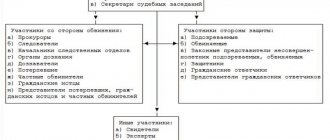Stages of the criminal process and their characteristics.
The stage of the criminal process is a separate part of criminal proceedings, aimed at achieving specific tasks inherent only to it.
All criminal proceedings in Russia are structured in the form of a system of interconnected stages, which represent independent parts of the activities of the subject of criminal proceedings (inquirer, investigator, prosecutor, judge or court), during which they, within their competence, carry out procedural actions determined by the criminal procedure law actions and make procedural decisions in the form of decrees, rulings, and the court also in the form of a sentence. The adoption of such a decision is the completion of each individual stage and serves as a procedural basis for the termination of procedural activities in a criminal case or for the transition of these activities to the next stage.
Each stage, despite the fact that it is interconnected with other stages, at the same time has a number of differences, which are expressed in the tasks performed at each individual stage, procedural actions that are possible or necessary to be performed only at a certain stage, etc. ., i.e. those features that distinguish this segment of the criminal process in the system of stages. These features are features[ 1 ] of each individual stage of criminal proceedings.
Based on the above, the signs
The stages of the criminal process can be formulated as follows (Diagram 2):
— direct tasks performed at a specific stage;
— a list of procedural actions inherent only to this stage;
- the final procedural act that completes a specific stage.
Thus, we can say that, for example, the stage of preliminary investigation begins with the issuance of a resolution by the investigator (inquiry agency, prosecutor) to initiate a criminal case (which is also a procedural act that completes the stage of initiation of a criminal case) and ends with the issuance of a resolution to terminate the criminal case, or by sending a criminal case with an indictment or indictment to the court to resolve the issue of the possibility of considering it on the merits. In this case, a decision to terminate criminal proceedings, an indictment or an indictment are also procedural acts that complete the stage of preliminary investigation.
We can say that in the criminal process in Russia there are 8 stages (6 main and 2 additional (exceptional)).[1]
These are the main stages through which the proceedings in virtually every criminal case go (Diagram 3):
1) criminal proceedings
, providing for a thorough check of the reliability of information about a crime committed or being prepared in order to detect signs of a crime sufficient to make a decision to initiate a criminal case or refuse to initiate one;
2) preliminary investigation
, carried out in the form of an inquiry or preliminary investigation and serving to establish the event of a crime, the persons guilty of committing it, as well as all other necessary circumstances that constitute the subject of proof in each criminal case and are listed in Art. 73 Code of Criminal Procedure of the Russian Federation. It is during the preliminary investigation, during pre-trial proceedings, through the implementation of procedural actions, that the initial collection of evidence takes place, through the study and comparison of which the subject of evidence (investigator, investigator, prosecutor) comes to the conclusion about the possibility of sending the case to court for further consideration or the need termination of proceedings on it, termination of criminal prosecution against a specific person or persons;
3) appointment of a court hearing
(trial stage). At this stage, the judge, having received a criminal case from the prosecutor, decides a number of issues, such as: can he consider the received case on its merits, i.e. whether it is within his jurisdiction, or the case must be sent for consideration to another court; Are there any grounds to return the criminal case to the prosecutor to correct technical errors made by the inquirer or investigator in accordance with Art. 237 Code of Criminal Procedure of the Russian Federation; terminate criminal proceedings or criminal prosecution in accordance with Art. 239 Code of Criminal Procedure of the Russian Federation; suspend the proceedings (Article 238 of the Code of Criminal Procedure of the Russian Federation) if the accused fled, became seriously ill, or for some other valid reason cannot participate
in the consideration of a criminal case (for example, located outside the Russian Federation), or it is necessary to wait for the decision of the Constitutional Court of the Russian Federation in this case on the compliance of the law applied or to be applied in it with the Constitution of the Russian Federation. If the judge does not see any of the listed grounds in the received case, he makes a decision to schedule a court hearing and the proceedings move to the next stage;
4) trial in the court of first instance
(stage of consideration of the criminal case on the merits). At this stage, a single judge or a collegial court (three professional judges or a jury) also resolve a number of issues, essentially the same ones that were resolved during the preliminary investigation. This stage ends with the issuance of a resolution (ruling) to terminate the criminal case (prosecution), or the issuance of a conviction or acquittal;
5) proceedings in the court of second instance
(appeal and cassation proceedings) serves as a verification stage of the legality, validity and fairness of decisions of the court of first instance that have not entered into legal force;
6) execution of sentence
. The stage at which a decision, ruling or sentence of a court (judge) that has entered into legal force is applied for execution, i.e. those authoritative orders of the court (judge) about what needs to be done and in relation to whom are fulfilled. In addition, a number of issues that arise during the execution of the sentence and are listed in Chapter 47 of the Code of Criminal Procedure of the Russian Federation are resolved.
Additional, i.e. those through which criminal proceedings take place in exceptional cases:
1) supervisory proceedings
, in which court decisions in criminal cases that have already entered into legal force are subject to review. A distinctive feature from cassation proceedings can be noted, along with the fact that court decisions that have entered into legal force are subject to review, as well as the prohibition of a turn for the worse, i.e. the criminal procedure law strictly prohibits revising court decisions in the direction of any worsening of the situation of the convicted person, an acquittal or a decision (ruling) to terminate a criminal case (Article 405 of the Code of Criminal Procedure of the Russian Federation);
2) resumption of cases due to new or newly discovered circumstances
differs from supervisory proceedings not only in the grounds of the proceedings (when reviewing a court decision in a supervisory procedure, the proceedings are not resumed), but also in the special procedure for proceedings in a criminal case at this stage, which is preceded by the cancellation of a court decision, ruling or sentence in this case that has entered into legal force (Article 413 of the Code of Criminal Procedure of the Russian Federation).
It should be noted that the criminal process in some cases presupposes a special procedure for proceedings in certain categories of cases, i.e. such a procedure in which there are significant differences from ordinary criminal proceedings:
1) a special procedure for making a court decision if the accused agrees with the charge brought against him (Chapter 40 of the Code of Criminal Procedure);
2) proceedings in criminal cases under the jurisdiction of a magistrate (Chapter 41 of the Code of Criminal Procedure);
3) proceedings in criminal cases heard by the court with the participation of jurors (Chapter 42 of the Code of Criminal Procedure);
4) criminal proceedings against minors (Chapter 50 of the Code of Criminal Procedure);
5) criminal proceedings on the application of compulsory medical measures (Chapter 51 of the Code of Criminal Procedure);
6) criminal proceedings against certain categories of persons (Chapter 52 of the Code of Criminal Procedure of the Russian Federation);
The stage of the criminal process is a separate part of criminal proceedings, aimed at achieving specific tasks inherent only to it.
All criminal proceedings in Russia are structured in the form of a system of interconnected stages, which represent independent parts of the activities of the subject of criminal proceedings (inquirer, investigator, prosecutor, judge or court), during which they, within their competence, carry out procedural actions determined by the criminal procedure law actions and make procedural decisions in the form of decrees, rulings, and the court also in the form of a sentence. The adoption of such a decision is the completion of each individual stage and serves as a procedural basis for the termination of procedural activities in a criminal case or for the transition of these activities to the next stage.
Each stage, despite the fact that it is interconnected with other stages, at the same time has a number of differences, which are expressed in the tasks performed at each individual stage, procedural actions that are possible or necessary to be performed only at a certain stage, etc. ., i.e. those features that distinguish this segment of the criminal process in the system of stages. These features are features[ 1 ] of each individual stage of criminal proceedings.
Based on the above, the signs
The stages of the criminal process can be formulated as follows (Diagram 2):
— direct tasks performed at a specific stage;
— a list of procedural actions inherent only to this stage;
- the final procedural act that completes a specific stage.
Thus, we can say that, for example, the stage of preliminary investigation begins with the issuance of a resolution by the investigator (inquiry agency, prosecutor) to initiate a criminal case (which is also a procedural act that completes the stage of initiation of a criminal case) and ends with the issuance of a resolution to terminate the criminal case, or by sending a criminal case with an indictment or indictment to the court to resolve the issue of the possibility of considering it on the merits. In this case, a decision to terminate criminal proceedings, an indictment or an indictment are also procedural acts that complete the stage of preliminary investigation.
We can say that in the criminal process in Russia there are 8 stages (6 main and 2 additional (exceptional)).[1]
These are the main stages through which the proceedings in virtually every criminal case go (Diagram 3):
1) criminal proceedings
, providing for a thorough check of the reliability of information about a crime committed or being prepared in order to detect signs of a crime sufficient to make a decision to initiate a criminal case or refuse to initiate one;
2) preliminary investigation
, carried out in the form of an inquiry or preliminary investigation and serving to establish the event of a crime, the persons guilty of committing it, as well as all other necessary circumstances that constitute the subject of proof in each criminal case and are listed in Art. 73 Code of Criminal Procedure of the Russian Federation. It is during the preliminary investigation, during pre-trial proceedings, through the implementation of procedural actions, that the initial collection of evidence takes place, through the study and comparison of which the subject of evidence (investigator, investigator, prosecutor) comes to the conclusion about the possibility of sending the case to court for further consideration or the need termination of proceedings on it, termination of criminal prosecution against a specific person or persons;
3) appointment of a court hearing
(trial stage). At this stage, the judge, having received a criminal case from the prosecutor, decides a number of issues, such as: can he consider the received case on its merits, i.e. whether it is within his jurisdiction, or the case must be sent for consideration to another court; Are there any grounds to return the criminal case to the prosecutor to correct technical errors made by the inquirer or investigator in accordance with Art. 237 Code of Criminal Procedure of the Russian Federation; terminate criminal proceedings or criminal prosecution in accordance with Art. 239 Code of Criminal Procedure of the Russian Federation; suspend the proceedings (Article 238 of the Code of Criminal Procedure of the Russian Federation) if the accused fled, became seriously ill, or for some other valid reason cannot participate
in the consideration of a criminal case (for example, located outside the Russian Federation), or it is necessary to wait for the decision of the Constitutional Court of the Russian Federation in this case on the compliance of the law applied or to be applied in it with the Constitution of the Russian Federation. If the judge does not see any of the listed grounds in the received case, he makes a decision to schedule a court hearing and the proceedings move to the next stage;
4) trial in the court of first instance
(stage of consideration of the criminal case on the merits). At this stage, a single judge or a collegial court (three professional judges or a jury) also resolve a number of issues, essentially the same ones that were resolved during the preliminary investigation. This stage ends with the issuance of a resolution (ruling) to terminate the criminal case (prosecution), or the issuance of a conviction or acquittal;
5) proceedings in the court of second instance
(appeal and cassation proceedings) serves as a verification stage of the legality, validity and fairness of decisions of the court of first instance that have not entered into legal force;
6) execution of sentence
. The stage at which a decision, ruling or sentence of a court (judge) that has entered into legal force is applied for execution, i.e. those authoritative orders of the court (judge) about what needs to be done and in relation to whom are fulfilled. In addition, a number of issues that arise during the execution of the sentence and are listed in Chapter 47 of the Code of Criminal Procedure of the Russian Federation are resolved.
Additional, i.e. those through which criminal proceedings take place in exceptional cases:
1) supervisory proceedings
, in which court decisions in criminal cases that have already entered into legal force are subject to review. A distinctive feature from cassation proceedings can be noted, along with the fact that court decisions that have entered into legal force are subject to review, as well as the prohibition of a turn for the worse, i.e. the criminal procedure law strictly prohibits revising court decisions in the direction of any worsening of the situation of the convicted person, an acquittal or a decision (ruling) to terminate a criminal case (Article 405 of the Code of Criminal Procedure of the Russian Federation);
2) resumption of cases due to new or newly discovered circumstances
differs from supervisory proceedings not only in the grounds of the proceedings (when reviewing a court decision in a supervisory procedure, the proceedings are not resumed), but also in the special procedure for proceedings in a criminal case at this stage, which is preceded by the cancellation of a court decision, ruling or sentence in this case that has entered into legal force (Article 413 of the Code of Criminal Procedure of the Russian Federation).
It should be noted that the criminal process in some cases presupposes a special procedure for proceedings in certain categories of cases, i.e. such a procedure in which there are significant differences from ordinary criminal proceedings:
1) a special procedure for making a court decision if the accused agrees with the charge brought against him (Chapter 40 of the Code of Criminal Procedure);
2) proceedings in criminal cases under the jurisdiction of a magistrate (Chapter 41 of the Code of Criminal Procedure);
3) proceedings in criminal cases heard by the court with the participation of jurors (Chapter 42 of the Code of Criminal Procedure);
4) criminal proceedings against minors (Chapter 50 of the Code of Criminal Procedure);
5) criminal proceedings on the application of compulsory medical measures (Chapter 51 of the Code of Criminal Procedure);
6) criminal proceedings against certain categories of persons (Chapter 52 of the Code of Criminal Procedure of the Russian Federation);
What is decided at this stage
Preparing for a court hearing involves finding answers to the following questions:
- Is a specific case within the jurisdiction of this court (determined according to Article 31 of the Criminal Procedure Code of the Russian Federation)?
- Have copies of the indictment or report been received by the accused? They are handed over by the prosecutor. These copies (upon appropriate request) can also be received by the defense lawyer and the victim.
- What to do with the preventive measure for the accused (cancel, select, change), should we extend the time for prohibiting specific actions, detention, house arrest? Chapters 13 - 14 of the Criminal Procedure Code of the Russian Federation are devoted to preventive measures and other coercive measures.
- Are submitted complaints or petitions satisfied?
- Is the execution of the punishment (fine) ensured?
- Is compensation for the damage caused by the crime ensured? Should the period of seizure (under Part 3 of Article 115 of the Code of Criminal Procedure) be imposed on the property be extended? The procedure for such an extension is determined by Part 1 of Art. 115.1 Code of Criminal Procedure.
- Are there grounds for a preliminary hearing (they are listed in Part 2 of Article 229 of the Code of Criminal Procedure)?
What to do next
The stage of preparation for the court hearing will continue with the ordering of a court hearing, a preliminary hearing, and sending the case to jurisdiction.
The resolution reflects:
- Date and place of issue.
- Name of the court, full name the judge who ruled it.
- Motivation for the subject resolution.
After the case is received by the court, a decision is made within 30 or 14 (if the accused are kept in custody) days. Copies of the resolution are sent to the prosecutor, victim, and accused.










